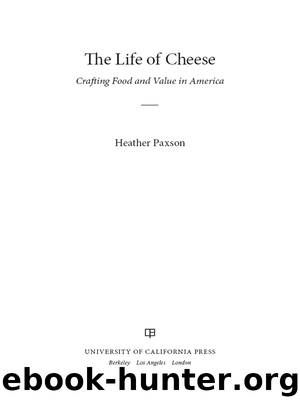The Life of Cheese by Paxson Heather

Author:Paxson, Heather
Language: eng
Format: epub
Publisher: University of California Press
Published: 2012-08-10T16:00:00+00:00
FIG. 20. Peter Dixon holding a vial of indicator solution in preparation for conducting an acid test using the acidometer on the right. Photo by author.
In the end, I discerned in the workshop a kind of technical intimacy with scientific instruments and principles. Herzfeld introduced the notion of “cultural intimacy” to describe the sometimes rueful self-awareness a people may share among themselves, but deny to outsiders, about the idiosyncrasies of their own cultural sensibilities.48 Behind the presentation of authoritative knowledge conveyed in Dixon’s classes and academic-sounding manuals is a shared, tacit understanding among practitioners (one that may be denied to safety inspectors or licensing regulators or other outsiders) that scientific testing (of pH or temperature) in artisanal cheesemaking may be more suggestive than definitive. Marcia Barinaga, a fledgling cheesemaker with a professional science background, explained that sometimes when taking a pH reading, “you look at it and say, ‘I think there’s something wrong with the pH meter. My gut tells me this cheese is right and I don’t trust my pH meter.’ You have to be ready to not trust your pH meter.” Measuring pH is as tacit and embodied as is feeling the grip of the curd. Thus do science and art come together in craft.
Artisan cheesemaking turns out to have much in common with running a series of laboratory-based scientific experiments. After all, the bench work of scientific experimentation relies not only on principles of scientific method but also on the sort of practical knowing (e.g., how to measure a fluid, use a pipette, read the contents of a Petri dish or a microscope slide) more commonly associated with craft.49 For this reason, it is insufficient for one scientist to write down the recipe of an experiment to enable another to verify her results by replicating the work.50 Tacit knowledge is required to do any work that is difficult to convey via a formulaic set of instructions. “But this scares some cheesemakers,” Marcia conceded, mentioning her friend Barbara, who taught herself to make cheese from a book that a friend translated from French. Barbara (whom I also interviewed) is skeptical of pH readings—not just the devices that take readings—and thinks of what she does as an art and not at all as a science. People who are not trained in scientific practice, who are excluded from scientists’ technical intimacy, tend to be committed to the idea of science as totally rational, objective—untainted by the subjective inclinations of the scientist. When it is revealed to them that scientific work is not sealed off from subjective experience and interpretation (or in other contexts, from political influence), laypersons may dismiss scientific expertise as useless or irrelevant. Here the epistemic virtue of art, presented as the alternative to technoscience, is in announcing that we are on subjective ground.
In fact, a scientific understanding of milk chemistry is not requisite to making cheese well. Nor does knowing more science lead seamlessly to new and improved ways of making cheese. Most commercial artisan cheesemakers do not understand much of the scientific information presented in Peter Dixon’s workshops.
Download
This site does not store any files on its server. We only index and link to content provided by other sites. Please contact the content providers to delete copyright contents if any and email us, we'll remove relevant links or contents immediately.
| Anthropology | Archaeology |
| Philosophy | Politics & Government |
| Social Sciences | Sociology |
| Women's Studies |
The Secret History by Donna Tartt(19092)
The Social Justice Warrior Handbook by Lisa De Pasquale(12191)
Thirteen Reasons Why by Jay Asher(8912)
This Is How You Lose Her by Junot Diaz(6889)
Weapons of Math Destruction by Cathy O'Neil(6281)
Zero to One by Peter Thiel(5802)
Beartown by Fredrik Backman(5759)
The Myth of the Strong Leader by Archie Brown(5509)
The Fire Next Time by James Baldwin(5448)
How Democracies Die by Steven Levitsky & Daniel Ziblatt(5219)
Promise Me, Dad by Joe Biden(5154)
Stone's Rules by Roger Stone(5088)
A Higher Loyalty: Truth, Lies, and Leadership by James Comey(4964)
100 Deadly Skills by Clint Emerson(4927)
Rise and Kill First by Ronen Bergman(4790)
Secrecy World by Jake Bernstein(4753)
The David Icke Guide to the Global Conspiracy (and how to end it) by David Icke(4720)
The Farm by Tom Rob Smith(4514)
The Doomsday Machine by Daniel Ellsberg(4490)
